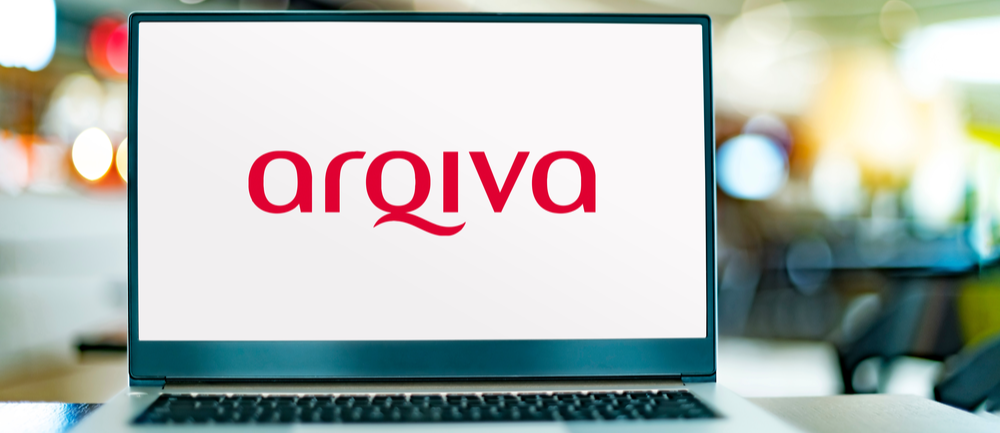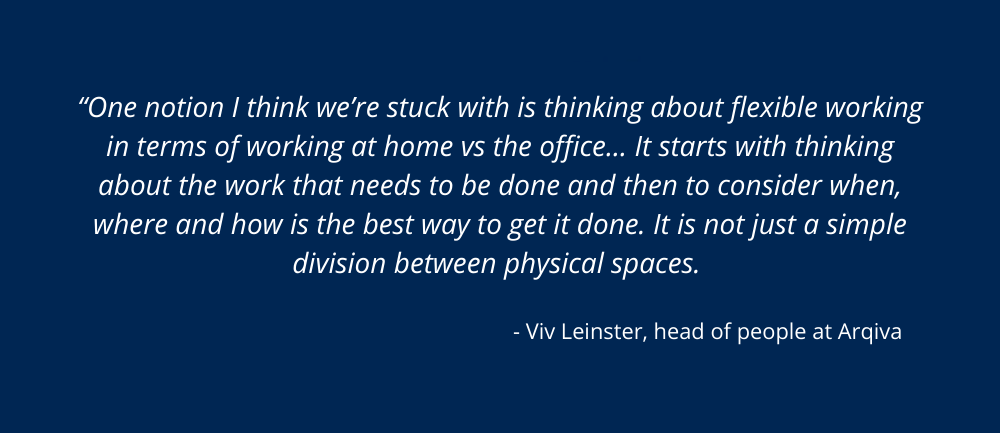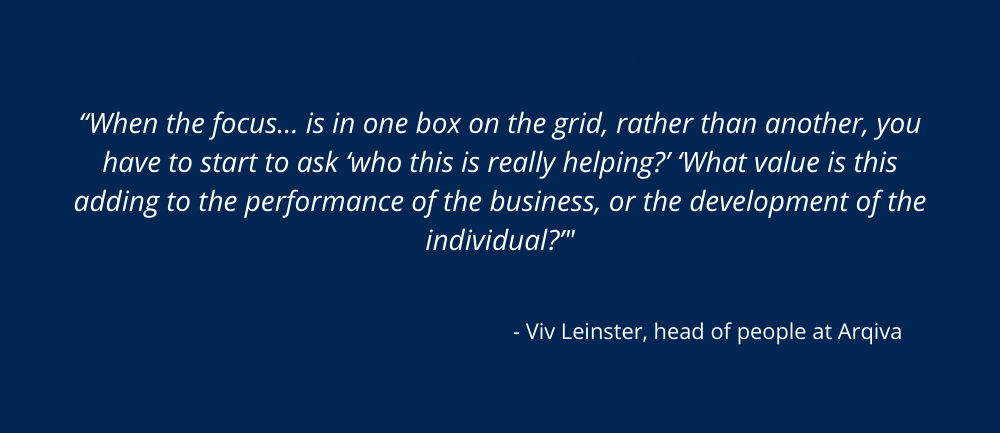-
Provided by

- Date published: Feb 7, 2022
- Categories
Arqiva is a telecommunications specialist headquartered in Hampshire. Unlike many organisations during the pandemic, the company has opted not to impose fixed directives around remote working. Instead, it has pursued a permissive, trust-based model that emphasises individual choice and convenience.
We speak to Viv Leinster, Arqiva’s head of people, about the reasons for this light-touch approach.
If there’s one thing Covid-19 has brought to our workplace, it’s rules.
Not just rules about social distancing and personal space, but rules about where we work. Rules about when we work. Rules about how we communicate, how we maintain contact and how we organise our after-work socials. The post-pandemic workplace offers more freedom than ever, but more regulation too.
However, not all companies have joined the march towards Wikis and directives. Arqiva, which provides infrastructure, broadcast transmission and smart meter facilities across the UK, has used the pandemic as a cue to adopt a more nuanced approach, based on self-determination and individuality.
“We want to empower our colleagues,” says Viv Leinster, explaining the decision to avoid prescription. “We want to offer them choice and support to work in ways that enable them to thrive.
“This is new to all of us. There is no well-trodden path to follow, and importantly, there is no right or wrong way. Employees respond positively to the opportunity to think about their roles differently, to try new ways of working, and to learn together to really take advantage of the opportunities available to them.”
Rules out, principles in
This approach is embedded in an approach known as ‘Work. Life. Smarter’ which stems from a desire to engage employees and give them control.
Instead of rules, Arqiva has created principles. Each of these is a guiding star for the new normal; as Viv explains, they allow the company to learn what its people want and provide frameworks for conversations.
These principles are backed up by Team Charters, which tackle key issues such as when and why the team attends an office, how often they get together in person as a team, and which channels are best for each specific form of communication.
It would be easy to resolve these issues with specific rules – dictating, for example, the number of hours a team must work together each day, or the way they will use Slack. Arqiva, however, trusts its people to work out what is best for them.
“We encourage our people to find solutions within their teams,” Viv says. “[We want them to] share their successes and their failures and keep evolving with what is required.”

Working, flexibly
This trust-based attitude is clearly evident in Arqiva’s approach to workplaces, a subject that has been central to all companies over the past two years.
Rather than making a hard-and-fast bet on remote, hybrid or any other arrangement, Viv and her team want to give their people the power to choose what works for them. It’s about flexibility – in every respect.
“One notion I think we’re stuck with is thinking about flexible working in terms of working at home vs the office,” Viv says. “It’s an important aspect to address, as flexible or hybrid working is so much more than that.
“It starts with thinking about the work that needs to be done and then to consider when, where and how is the best way to get it done. It is not just a simple division between physical spaces.
“For example, Arqiva operates critical national infrastructure. We have many colleagues performing roles that cannot be done anywhere else – maintaining an antenna at the top of a 1,000ft mast cannot be done from your back bedroom. So we have worked hard to acknowledge the wide range of roles and how the broader principles of hybrid flexible working can work and support everyone.
“The pandemic has helped many find a better balance between work and personal lives. That’s instrumental in supporting people so that they feel happier, healthier and more productive.”

Moving away from process
At the same time, Arqiva is rebuilding its approach to talent. The new approach is designed to adapt to individual circumstances, rather than relying on a specific set of metrics that can be applied to every single hire.
This doesn’t mean the company is ignoring data. Far from it in fact: Arqiva is using information from tools such as Stratigens and Talent Intuition to shine a light on candidate pools and create forensic skills filters.
For one role, Viv reveals, the company has activated six specific technical skills as ‘must-haves’, but only four are named as critical. “The data told us four of these skills were in high supply, vs two in low supply.”
However, when it comes to individual assessments, the company has ripped up the old tick-box methodology in favour of something more personal.
“We are moving away from process and looking towards coaching conversations and looking forward,” says Viv. “We have ditched processes like the nine-box grid in assessing performance and potential.
“When the focus of the conversation centres around where and why someone is in one box on the grid, rather than another, you have to start to ask ‘who this is really helping?’ ‘What value is this adding to the performance of the business, or the development of the individual?’
“Instead [of grids and similarly rigid approaches], we equip our leaders and, importantly, also our employees with conversation guides in a variety of areas, such as how to set and establish expectations and goals, creating development plans, improving performance and mental and physical health and wellbeing.
“These are designed to create constructive and coaching conversations that people value and can action going forward.”

Is a different approach a good approach?
Of course, Arqiva’s approach won’t be for everyone.
By taking the alternative angle, and establishing clear policies and procedures, companies can give their people clarity and establish unity across the organisation. The CIPD, for one, has stressed the importance of “defining hybrid working with regard to the specific organisational context” and “planning for and responding to the organisational implications of hybrid working on matters such as technology, employee wellbeing, inclusion and facilities.” In other words, taking an approach that is simple and universal.
However there is clear merit to the route Arqiva has gone down, too.
Our people now expect enlightened, customisable workplace policies as standard. Studies carried out by Ernst and Young last year found that nearly half of all workers would quit their jobs if they weren’t offered flexible working. This trend is even stronger among Millennials, 90% of whom identify flexibility as a top priority when choosing between employers. And we’re not talking about the choice of home and office here; we’re talking about the choice to work wherever, and however, suits the individual best.

In the face of this trend, companies can’t be too rigid in their approach to the post-pandemic reality. They need to coax rather than coerce, allowing employees to choose their own working practices while setting a new set of standards and expectations, based around productivity rather than presenteeism.
Indeed, various thinktanks and journals of record have espoused the importance of charters, of the type pioneered by Arqiva. The goal of these blueprints isn’t to set policies in stone but rather to light a path. To show the individuals within a team, and an organisation, what they should be working towards, and turn them into ambassadors for the culture.
As Forbes noted in a piece at the outset of the pandemic, “People are working from home and may never return to the office in the way they once knew it. This means they may not be receiving the same direction, guidance or coaching from leaders, and culture is about guiding the actions and decisions of all employees at all levels to a true north.”
The key, through all this, is communication.
Arqiva wants to open a constant two-way channel, both vertical and horizontal. By doing so, Viv and her people want to embed a set of values that are self-reinforcing and self-policing; team members willl drive the culture forward, empowered to shape their own working practices and motivated to carry the torch forward in return.

Constant review
The values themselves will change, of course. Viv stresses that the principles are being constantly reviewed, with regular adjustments in response to both the changing external environment and feedback from employees.
But the underlying tenet will remain the same: Arqiva is a company that values its employees.
The purpose is common – Viv says her long-term goal is to create a ‘One Arqiva’ approach, which rips down any individual silos – but every team member will be treated as an individual.
“Creating and sustaining a healthy culture is key, but so often culture is just dismissed as ‘the way it is around here’ and can’t be changed,” says Viv. “We believe that by setting culture goals that are aligned to our strategy, we can take tangible actions that will underpin the culture that will help Arqiva and our people thrive.”
“Being open with our people that we don’t know what the long-term answer is, and that we want to work with them to discover it together, has been challenging at times but it has proved to be the right course of action.
“We can now move in an agile and swift manner and our conversations focus on creating new ways of working that meet everyone’s needs. Too many organisations have been very prescriptive and employees are now feeling disempowered, which in turn leads them to a defensive position where they feel they need to fight against the rules rather than be part of the solution.”
Some will argue that the uncertainty of the pandemic demand clear, transparent rules that can be applied to everyone. But Arqiva’s approach is adaptable, not to mention scalable. No matter where the pandemic takes us, Viv and her team can follow.
